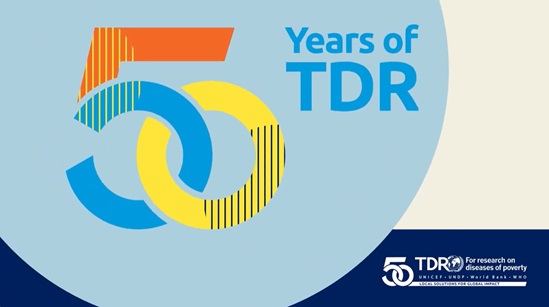
About us
About us
TDR, the Special Programme for Research and Training in Tropical Diseases, is a global programme of scientific collaboration that helps facilitate, support and influence efforts to combat diseases of poverty. It is co-sponsored by the United Nations Children’s Fund (UNICEF), the United Nations Development Programme (UNDP), the World Bank and the World Health Organization (WHO).

Our Vision
“The health and well-being of people burdened by infectious diseases of poverty is improved through research and innovation.”
Our Mission
“To support effective and innovative global health research, through strengthening the research capacity of disease-affected countries, and promoting the translation of evidence into interventions that reduce the burden of infectious diseases and build resilience in the most vulnerable populations.”
Relationships with our other co-sponsors UNICEF, UNDP and the World Bank are also critical to our success, particularly in optimizing our contribution to the UN Sustainable Development Goals. For example, we work with UNICEF on common approaches to children affected by poverty-related diseases, such as tuberculosis; with UNDP, we work to increase access to new products by engaging various stakeholders in countries and strengthening national capacities; and the World Bank’s agenda of increased health system resilience provides an opportunity for us to work together on implementation issues specific to country needs.
Our performance
Measuring not only what we do but how we do it
TDR performance measurement is guided by the TDR performance assessment framework. The framework has been developed in consultation with key stakeholders to help guide the implementation of TDR’s strategy. It has the following objectives:
- Promote continuous performance improvement through organizational review, learning and informed decision-making.
- Enhance accountability to stakeholders, including beneficiaries, partners and resource contributors.
Stay in touch with the latest research information
Latest publications
View all →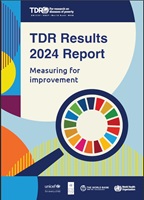
TDR results 2024 report
The 2024 results report marks the first year of measuring TDR’s performance based on the revised performance framework in which indicators have been...
TDR annual report 2024
This report highlights the impact of research supported by the UNICEF/UNDP/World Bank/WHO Special Programme for Research and Training in Tropical Diseases...
TDR performance framework (2024-2029)
This revision of TDR’s performance framework aligns with the 2024–2029 strategy and its objectives, while building on lessons learned from...
TDR strategy documents
View all →TDR Strategy 2024-2029
For almost 50 years, TDR has been a leader in research to address infectious diseases of poverty and in building the capacity of people, communities and...
TDR Intersectional gender research strategy
Gender norms, roles and relations are all known to influence people’s susceptibility to different health conditions, particularly those associated...
TDR strategy 2018-2023
This document covers the TDR strategy for 2018-23. It lays out TDR’s focus on research for increased implementation and access, graphically displaying...
Results reports and performance frameworks
View all →
TDR results 2024 report
The 2024 results report marks the first year of measuring TDR’s performance based on the revised performance framework in which indicators have been...
TDR performance framework (2024-2029)
This revision of TDR’s performance framework aligns with the 2024–2029 strategy and its objectives, while building on lessons learned from...
TDR results 2023 report
The TDR results report is produced by its secretariat every year to document the progression on indicators related to three overarching categories: technical...
Team reports, financial reports and programme budgets
View all →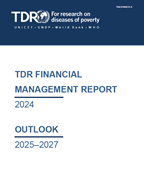
TDR financial management report 2024 and outlook 2025-2027
View PDF
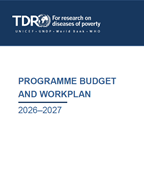
TDR Programme budget and workplan 2026-2027
The 2026–2027 Programme Budget and Workplan represents the second biennium into TDR’s six-year Strategy for 2024–2029 which, in turn,...
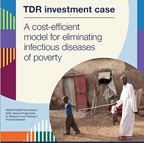
TDR investment case
TDR, the Special Programme for Research and Training in Tropical Diseases, is a global programme of scientific collaboration that helps facilitate, support...
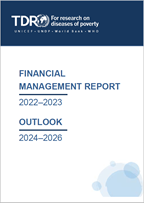
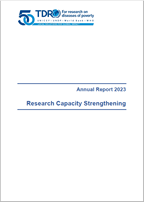
Annual report 2023: Research capacity strengthening
Research Capacity Strengthening activities are at the heart of the UNICEF/UNDP/World Bank/WHO Special Programme for Research and Training on Tropical Diseases...
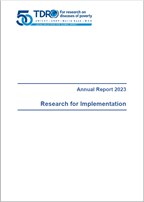
Annual report 2023: Research for implementation
Research for implementation is one of the three strategic priority areas of the UNICEF/UNDP/World Bank/WHO Special Programme for Research and Training...
External reviews
View all >>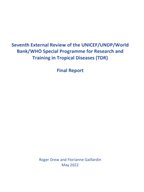
Seventh external review of TDR
External reviews of TDR take place every five to seven years. The previous review, the sixth, took place in 2016. The current review looks at the early...
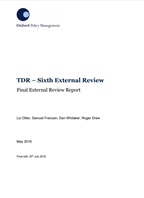
The Sixth External Review
This 6th external review of TDR, conducted in 2015, was requested by the Joint Coordinating Board. The mandate was to investigate and analyse the strategic...
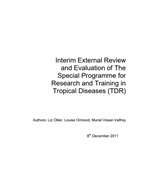
Interim External Review and Evaluation of TDR
The TDR Interim External Review was carried out as a mid-term strategy evaluation covering the years 2008 to 2011. It provided the basis for the 2012-2017...
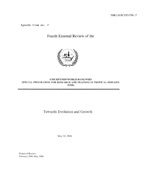
The Fourth External Review
The Fourth External Review Committee (ERC) was asked by the TDR Joint Coordinating Board to look at TDR's performance in the past 5-6 years, with particular...

The Third External Review
This report presents a global strategic assessment of TDR as reviewed by the Third External Review Committee in 1997/8.The report first focuses on TDR’s...
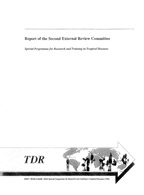
The Second External Review
The second external review and evaluation of the UNDP/WORLD BANK/ WHO Special Programme for Research and Training in Tropical Diseases (TDR) was conducted...
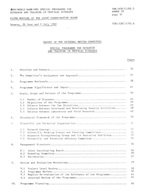
The First External Review
The First External Review is part of the JCB 5 report.At the its December 1980 meeting, the Joint Coordinating Board of the UNDP/World Bank/ WHO Special...


